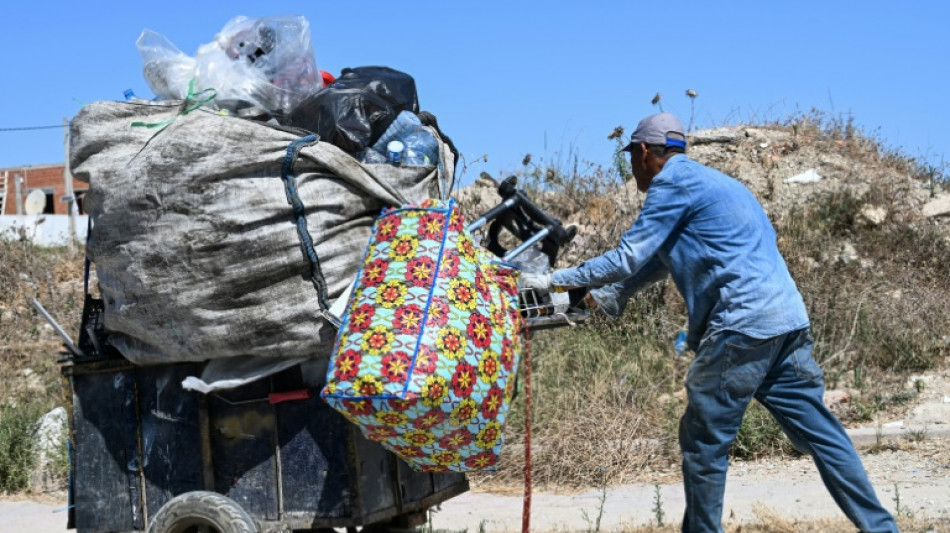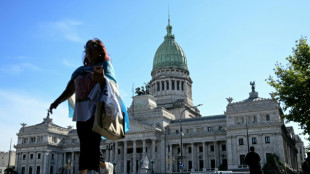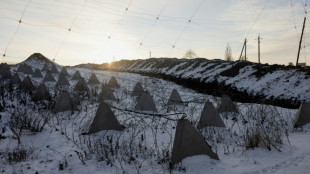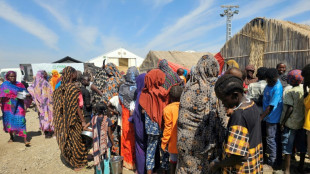
-
 McIlroy shares Riviera clubhouse lead as Rai charges, Scheffler fades
McIlroy shares Riviera clubhouse lead as Rai charges, Scheffler fades
-
Philippines' Duterte earned global infamy, praise at home

-
 Stocks drop, oil rises after Trump Iran threat
Stocks drop, oil rises after Trump Iran threat
-
As European heads roll from Epstein links, US fallout muted

-
 Families of Duterte's drug war victims eye Hague hearing hopefully
Families of Duterte's drug war victims eye Hague hearing hopefully
-
Russian decision is a betrayal: Ukrainian Paralympics chief

-
 Venezuela parliament unanimously approves amnesty law
Venezuela parliament unanimously approves amnesty law
-
Martinez missing as Inter limp to Lecce after Bodo/Glimt humbling

-
 India chases 'DeepSeek moment' with homegrown AI models
India chases 'DeepSeek moment' with homegrown AI models
-
World leaders to declare shared stance on AI at India summit

-
 'Everything was removed': Gambians share pain with FGM ban in balance
'Everything was removed': Gambians share pain with FGM ban in balance
-
Kim Jong Un opens rare party congress in North Korea

-
 Ex-Philippine leader Duterte faces pre-trial ICC hearing
Ex-Philippine leader Duterte faces pre-trial ICC hearing
-
Japanese star Sakamoto 'frustrated' at missing Olympic skating gold

-
 Japan inflation eases in welcome news for Takaichi
Japan inflation eases in welcome news for Takaichi
-
FIFA to lead $75m Palestinian soccer rebuilding fund

-
 Chicago Bears take key step in proposed Indiana stadium move
Chicago Bears take key step in proposed Indiana stadium move
-
Liu captures Olympic figure skating gold as US seal hockey glory

-
 North Korea opens key party congress
North Korea opens key party congress
-
Los Angeles sues Roblox over child exploitation claim

-
 Golden Liu puts US women back on top of Olympic women's figure skating
Golden Liu puts US women back on top of Olympic women's figure skating
-
Hodgkinson sets women's 800m world indoor record

-
 USA's Alysa Liu wins Olympic women's figure skating gold
USA's Alysa Liu wins Olympic women's figure skating gold
-
Man Utd cruise into Women's Champions League quarters

-
 Gu reaches Olympic halfpipe final after horror crash mars qualifiers
Gu reaches Olympic halfpipe final after horror crash mars qualifiers
-
Keller overtime strike gives USA Olympic women's ice hockey gold

-
 NASA delivers harsh assessment of botched Boeing Starliner test flight
NASA delivers harsh assessment of botched Boeing Starliner test flight
-
US Fed Governor Miran scales back call for rate cuts this year

-
 Gu qualifies for Olympic halfpipe final marred by horror crash
Gu qualifies for Olympic halfpipe final marred by horror crash
-
Trump issues Iran with ultimatum as US ramps up military presence

-
 Peru's brand-new president under fire for child sex comments
Peru's brand-new president under fire for child sex comments
-
UK police hold ex-prince Andrew for hours in unprecedented blow

-
 Former Olympic freeski halfpipe champion Sharpe crashes heavily
Former Olympic freeski halfpipe champion Sharpe crashes heavily
-
Former Olympic champion Sharpe suffers heavy halfpipe crash

-
 Belarus says US failed to issue visas for 'Board of Peace' meeting
Belarus says US failed to issue visas for 'Board of Peace' meeting
-
Forest boss Pereira makes perfect start with Fenerbahce rout in Europa play-offs

-
 Alcaraz fights back to book last four berth in Qatar
Alcaraz fights back to book last four berth in Qatar
-
England captain Itoje warns of 'corrosive' social media after abuse of Ireland's Edogbo

-
 War-weary Sudanese celebrate as Ramadan returns to Khartoum
War-weary Sudanese celebrate as Ramadan returns to Khartoum
-
Townsend expects recalled Scotland duo to shine in Six Nations clash with Wales

-
 Peru's new president under fire for child sex comments
Peru's new president under fire for child sex comments
-
UK king opens London fashion week despite brother's arrest

-
 Belarus frees opposition politician Statkevich
Belarus frees opposition politician Statkevich
-
Striking Argentine workers slow down Buenos Aires in protest over labor reforms

-
 Starlink loss a blow to Russian forces in Ukraine: experts
Starlink loss a blow to Russian forces in Ukraine: experts
-
UN's Sudan probe finds 'hallmarks of genocide' in El-Fasher

-
 Belarus frees opposition politician Statkevich: wife
Belarus frees opposition politician Statkevich: wife
-
Rocket re-entry pollution measured in atmosphere for first time

-
 Airbus ready to build two new European fighters if countries want
Airbus ready to build two new European fighters if countries want
-
Canada makes push to attract skilled migrants, including for defence


Tunisia plastic collectors spread as economic, migration woes deepen
A towel draped over his head, Hamza Jabbari sets bags of plastic bottles onto a scale. He is among Tunisia's "barbechas", informal plastic recyclers whose increasing numbers reflect the country's economic -- and migratory -- woes.
The 40-something-year-old said he starts the day off at dawn, hunching over bins and hunting for plastic before the rubbish trucks and other plastic collectors come.
"It's the most accessible work in Tunisia when there are no job offers," Jabbari said, weighing a day's haul in Bhar Lazreg, a working-class neighbourhood north of the capital, Tunis.
The work is often gruelling, with a kilogramme of plastic bottles worth only 0.5 to 0.7 Tunisian dinar -- less than $0.25.
In Tunis, it's common to see women weighed down by bags of plastic bottles along the roadside, or men weaving through traffic with towering loads strapped to their motorcycles.
"Everyone does it," said Jabbari.
- 'Supplementary job' -
Hamza Chaouch, head of the National Chamber of Recyclable Waste Collectors, estimated that there were roughly 25,000 plastic collectors across Tunisia, with 40 percent of them in the capital.
Yet, with the job an informal one, there is no official count of how many plastic collectors operate in Tunisia.
One thing is certain: their number has increased in recent years, said Chaouch, who also runs a plastic collection centre south of Tunis.
"It's because of the cost of living," he explained.
"At first, it was people with no income, but for the past two years, workers, retirees and cleaning women have also turned to this work as a supplementary job."
Around 16 percent of Tunisians lived under the poverty line as of 2021, the latest available official figures.
Unemployment currently hovers around 16 percent, with inflation at 5.4 percent.
The ranks of these recyclers have also grown with the arrival of migrants from sub-Saharan Africa -- often hoping to reach Europe but caught in limbo with both the EU and Tunis cracking down on Mediterranean crossings.
Tunisia is a key transit country for thousands of sub-Saharan migrants seeking to reach Europe by sea each year, with the Italian island of Lampedusa only 150 kilometres (90 miles) away.
Abdelkoudouss, a 24-year-old from Guinea, said he began collecting plastic to make ends meet but also to save up enough money to return home after failing two crossing attempts to Europe.
For the past two months, he has worked at a car wash, he said, but the low pay forced him to start recycling on the side.
"Life here is not easy," said Abdelkoudouss, adding he came to the capital after receiving "a lot of threats" amid tension between migrants and locals in Sfax, a coastal city in central Tunisia.
- 'Just trying to survive' -
Thousands of migrants had set up camp on the outskirts of Sfax, before authorities began dismantling the makeshift neighbourhoods this year.
Tensions flared in early 2023 when President Kais Saied said "hordes of sub-Saharan migrants" were threatening the country's demographic composition.
Saied's statement was widely circulated online and unleashed a wave of hostility that many migrants feel still lingers.
"There's a strong rivalry in this work," said Jabbari, glancing at a group of sub-Saharan African migrants nearby.
"These people have made life even more difficult for us. I can't collect enough plastic because of them."
Chaouch, the collection centre manager, was even more blunt: "We don't accept sub-Saharans at our centre. Priority goes to Tunisians."
In contrast, 79-year-old Abdallah Omri, who heads another centre in Bhar Lazreg, said he "welcomes everyone".
"The people who do this work are just trying to survive, whether they're Tunisian, sub-Saharan or otherwise," he said.
"We're cleaning up the country and feeding families," he added proudly.
D.Kaufman--AMWN



